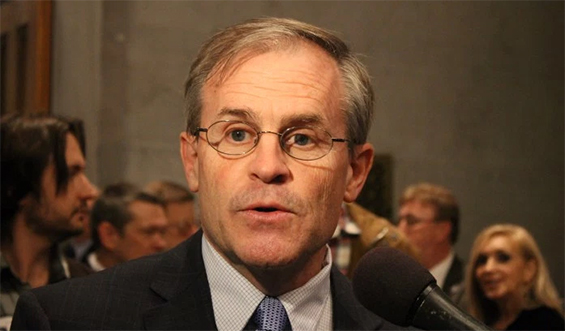
Tennessee Rep. Bill Dunn (R-Knoxville) delayed a floor vote on his school voucher bill after up to 22 amendments were proposed before the bill was slated to be discussed on the House floor this week — and then he abandoned the effort altogether after acknowledging that he lacked the votes to support it.
Dunn did not disclose the specifics of the initial revisions, but said:
“Some are serious and some are silly. Some are to make a point. But I’m down here to make a difference.”
House Minority Leader Craig Fitzhugh (D-Ripley) opined that the changes would have improved a bad bill, but would not have made it acceptable for a vote, report Jason Gonzales and Joel Ebert for The Tennessean.
Fitzhugh, along with other opponents of the bill, did not want the bill to be delayed, but the legislation to was put on hold until Thursday when it was ultimately cancelled, writes Richard Locker of the Memphis Commercial Appeal. Dunn counted 51 House members who agreed with his proposal.
Some opined that Dunn was right to ask for the delay since a number of the lawmakers who had supported the legislation were absent at the time. One absent representative was Rep. Jeremy Durham (R-Franklin) who had taken a two-week break from the legislature.
House Bill 1049 supported a program that offers government-funded scholarships that allow parents to pay for private school tuition. Students who are eligible for the benefit would have to be receiving free or reduced lunches and attend or be zoned for a school in the bottom 5% of schools in the state.
There was a limit to the number of students who could apply, but the bill called for an expansion to 20,000 vouchers in the future. Any vouchers not used would be given to students who live in a district where at least a single school is in the bottom 5% of schools. According to Dunn, students who receive vouchers must be at-risk.
The Tennessee Federation for Children and the Tennessee Parents/Teachers Putting Students First, along with other pro-voucher groups, have donated over $131,000 to members of the General Assembly in the last few months, with the most money going to House lawmakers.
Anti-voucher groups, including Tennesseans Reclaiming Educational Excellence, spent many hours lobbying against the bill. Other organizations held rallies statewide to protest the measure.
State Rep. Johnny Shaw (D-Bolivar) stated that he was against the bill. He has said he feels the voucher idea could damage the public school system.
“I think in the long run we’re putting burdens, future if not present burdens on the public school system and for that reason I’m not sold on the vouchers,” said Representative Shaw.
Shaw added that his constituency wanted him to vote against the bill based on conversations he has had with the people in his district, and that was what he would do.
Republican Gov. Bill Haslam has been supportive of the voucher system for years, says WBBJ-TV News.
The program would be funded from the state budget and also from private schools that have agreed to be involved in the scholarship funding. Students who take part in the voucher program would be required to take state standardized tests to assess the program’s viability.
Dunn’s bill is an effort to allow public money to be spent by low-income parents whose children are attending schools that are in the bottom 5%, which would facilitate moving their children to private schools, including religious schools, writes the Times Free Press’ Andy Sher.
Sher reports that Rep. Durham’s leave of absence was a time for him to seek “assistance from professional and pastoral counselors” because of complaints from Capitol Hill workers that he sent unrequested text messages to them and, in some cases, asked for inappropriate pictures.
Dunn shared with his fellow legislators that he wanted the bill to apply only to Tennessee’s four largest counties, which are Shelby, Davidson, Knox, and Hamilton. But he added that he wanted to create a version that could pass, writes Erik Schelzig of the Associated Press.
When the time came Thursday to vote on the bill, Dunn said that he didn’t want to waste time debating a bill on the floor when it did not have the votes to pass.




